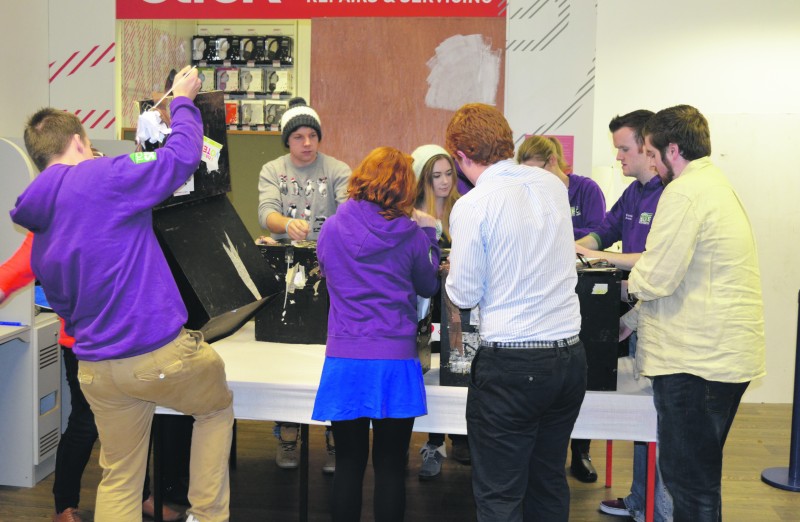Kevin Threadgold | Contributing Writer
I study Political Science. I didn’t vote in the SU presidential impeachment referendum.
This simple state of affairs got me thinking. When I turned eighteen, I thought of people who didn’t bother to vote as borderline traitors: surely the right to vote in a democratic election has to be exercised? I hadn’t simply been brainwashed by CSPE classes either. The more I learned about representative democracy, the more important I considered turnout, and the less I identified with those who shunned voting. And yet, despite the guilty feeling it gave me, I didn’t vote this time. I was left struggling to understand why.
Initially I felt like voting NO, for reasons of convenience as much as anything. Tom seemed to be a decent character, very well liked among his colleagues and those who had campaigned for him. He had already apologised and been punished by the university. His statement in the opening pages of the SU journal spoke to me – it shared my view that college isn’t always all it’s cracked up to be. Admittedly, his trustworthiness had been compromised, but surely impeachment would only cause upheaval rather than making the union work better.
Muddying the waters thoroughly was the mental health issue. Whether it was an excuse or just some explanatory context, it complicated the debate. Part of me wanted a successful presidency for Tom, to show that depression or a stigma around mental health need not prevent people from succeeding – but taking it out of the equation, I’d be less willing to forgive someone who had cheated.
Student politics is undeniably different from national or even local government. With a term of one year, it’s almost a bit rich to expect sabbatical officers to achieve anything beyond the fundamentals of their mandate.
As the week wore on, my voting preference began to change. The absence of an official YES campaign only gave the NO side the chance to shoot itself in the foot. I consider James Ringland a friend and a true gent, but there are only so many hashtags a man can tolerate. On top of this, some of the campaign rhetoric was baffling to say the least. One article in particular tried to convince me to vote NO, but relied so heavily on cheap scaremongering about mental health discrimination and party politics that it actually had the opposite effect. Combined with some astute analysis on the YES side, I was left conflicted. On an issue of national importance, I feel I would have forced myself to decide. In the interest of accountability and standards of public office, I most likely would have voted YES. In the end, I didn’t vote at all, but not simply because I felt too conflicted to decide.
I wasn’t alone either. A few of my classmates felt the same, and the irony wasn’t lost on us. I didn’t believe the usual justifications for not voting; I had learned enough about politics to know how hollow they could be. The importance of context became increasingly clear. On a national level, I could be described as “highly politically active”: I take a keen interest in current affairs and vote whenever I can. This vote was in the context of Trinity SU politics, though, and I took the same attitude to voting as those whose behaviour I struggled so much to understand.
Student politics is undeniably different from national or even local government. With a term of one year, it’s almost a bit rich to expect sabbatical officers to achieve anything beyond the fundamentals of their mandate. For better or worse, Tom Lenihan will be out of office within a year. This led me to think, “what harm if he carries on?” and it leaves student elections especially vulnerable to overzealous and hollow campaign promises. At the height of last February’s campaign, looking for something beyond gimmickry, I noted Tom’s policy of “Trinity-specific internships across all faculties”. Is this happening? Members of Team Tom would undoubtedly tell you that it will, or it already is. Anyway, what would it matter if he promised the earth and delivered nothing whatsoever? How much credit does Dan Ferrick get for the 24-hour BLU library during exams that happened under his tenure as Education Officer? For the first time in my life, I didn’t feel what I was being asked to vote on was important enough to force a decision either way.
For the first time in my life, I didn’t feel what I was being asked to vote on was important enough to force a decision either way
You might be wondering what the conclusion is. All I would suggest is that if someone like me, who has a strong interest in politics and votes at every given opportunity, is disillusioned enough not to vote, it sets a troubling precedent. Something like this may have been said before, but it bears repeating. To counter the inherently temporary nature of student politics, candidates need to make responsible and genuine promises, and (most importantly) do their utmost to fulfil them, or they risk making the whole endeavour look pointless and alienating droves of students.
I wish Tom Lenihan all the best, and a very fruitful remainder of term as President, not least with all those internships he promised.







